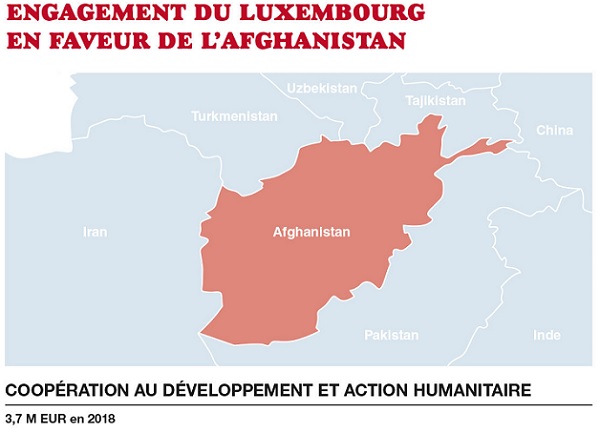
On Wednesday 28 November 2018, Luxembourg's Minister of Foreign and European Affairs, Jean Asselborn, traveled to Geneva to attend the conference on Afghanistan at the joint invitation of the Minister of Foreign Affairs of the Islamic Republic of Afghanistan, Salahuddin Rabbani, and the Special Representative of the UN Secretary General for Afghanistan, Tadamichi Yamamoto.
In the presence of the Afghan President, Ashraf Ghani, and the Afghan Chief of Staff, Abdullah Abdullah, the political, social and economic challenges facing Afghanistan have been central to the debate.
In the continuity of the Tokyo (2012), London (2014) and Brussels (2016) conferences, the Geneva conference was an opportunity to review all aspects of the efforts in the country, as well as the commitments of the Afghan authorities, and international donors, to strengthen their action for the socio-economic development of the country and the peace process.
Welcoming "the extraordinary determination and courage of the millions of Afghans who took to the polls on 20 October, often at great risk to their lives, to participate in the democratic process and thus contribute to the future of their country", Minister Asselborn began his speech by condemning the attacks made in recent months and weeks against voter registration centres, and also against schools and religious centres. He explained that "these ruthless criminals, who are trying to derail the democratic process in Afghanistan by these barbaric acts, and to undermine the hope of those who believe in peace, reinforce our determination to remain with the Afghans, to help them consolidate the country and make Afghanistan a stable and secure country."
The head of Luxembourg diplomacy then recalled that a lasting peace in Afghanistan can only be achieved through a negotiated political process, "in a spirit of openness and compromise" and in this context welcomed the peace offer formulated during the Kabul II process, as well as the various attempts of dialogue with the Taliban that were launched. "We hope that these initiatives can truly lead - with the help of regional partners - to the establishment of a viable peace process in Afghanistan, which will culminate in inclusive, credible and transparent presidential elections in 2019. These elections may constitute a real opportunity to strengthen the democratic process," he explained.
He also encouraged the Afghan authorities to pay particular attention to the rights of children and women's rights, to put in place measures to prevent forced marriages, torture and discrimination, and to protect human rights as well as journalists.
Since 2001, Luxembourg's contributions to Afghanistan have amounted to nearly €89 million. This have gone towards humanitarian aid and development cooperation projects, as well as to security support. Since 2003, the Grand Duchy has also made available more than 320 military personnel, as part of NATO's missions in Afghanistan, and intends to contribute up to €4 million a year, until 2024, to the Trust Fund for the Afghan National Army.
"By 2020, my country will have provided more than €100 million of assistance to stabilise Afghanistan," said Minister Asselborn, noting that "these contributions are not in vain. Progress is there. But there is still some way to go. We expect a real commitment from all stakeholders to stop the conflict, for the country to fully develop, and for the Afghan people to live in peace and security again. This is the challenge of our meeting today".
In Geneva, the European Commission, through Commissioner Mimica, has signed an aid package worth €474 million to support the strengthening of state institutions, public sector reforms, health, justice and the next elections, as well as to address the challenges of migration and displacement in Afghanistan.








